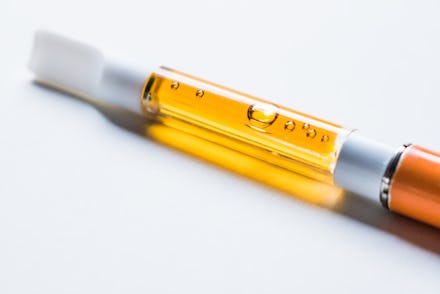These are the shady chemicals in bootleg vapes that could be making people sick

As of September, 805 cases of a bewildering lung disease apparently related to vaping have been reported to the Centers for Disease Control. The stat was a more than 50% jump from the number of reported cases less than two weeks prior, according to CNBC. Twelve deaths have also been reported. While the CDC notes that the culprit behind the lung disease remain unknown — no single substance has been connected to all cases — experts have homed in on a few shady substances in bootleg vape juice that could be causing health problems.
There are certain chemicals in vapes purchased from anywhere other than authorized retailers, which studies have pointed to as especially concerning.
CannaSafe — an accredited testing lab in Los Angeles — tests every authorized cannabis-based vape product en route to retail in California (where recreational use is legal) for various pesticides, heavy metals, and other adulterants. But they sometimes also test unauthorized vapes — from unlicensed dispensaries, or people who have fallen ill with the lung disease, for instance—to show how their results differ from authorized products.
At least 80% of the unauthorized vapes CannaSafe tested recently contained vitamin E, says Aaron Riley, president of the lab. Food and Drug Administration investigators have detected vitamin E acetate, an oil derived from vitamin E, in cannabis e-cigarettes gathered from individuals who had fallen ill with the potentially vape-related lung disease, according to a September 6 Washington Post report. The oil has been found in nearly all cannabis samples collected from patients in New York, leading the state health department to focus on the ingredient as a possible culprit.
Unauthorized manufacturers often cut their products with vitamin E oil and market them as more potent than they really are, Riley tells Mic. They might claim that their products contain 90% cannabinoids — compounds unique to cannabis, like tetrahydrocannabinol, or THC, which gets you high — when they really only contain 50% cannabinoids and 50% cutting agents, like vitamin E.
A number of foods, such as wheatgerm oil, almonds and avocados, are rich in vitamin E, and lotion and other skincare products often contain it, too. But while eating or slathering vitamin E onto skin is safe, inhaling it seems to be dangerous. Riley, along with other experts, says it could coat the inside of the lungs. “You’re basically suffocating yourself,” he explains.
Riley and his team have also detected higher levels of heavy metals (they test specifically for lead, cadmium, mercury, and arsenic) in the cartridges of unauthorized cannabis vapes, the part that holds the e-liquid, which gets heated and turned into aerosol. These cartridges can leach heavy metals into the e-liquid. In authorized products, though, the cartridges tend to be made of pricier, medical-grade stainless steel. Chronic exposure to heavy metals may lead to cardiovascular system damage, lung disease, lung cancer, and numerous other health problems, per the CDC.
Every unauthorized vape CannaSafe has tested also contained “very high levels of pesticides,” Riley says. Again, while consuming trace amounts of pesticides, in say, wine, hasn’t landed anyone in the hospital, inhaling them may be a different story.
While we still don’t know exactly what’s making people sick (or in some cases killing them), you can take steps to stay safe. Until researchers identify the chemical(s) responsible, the CDC recommends setting vapes aside, especially those that contain THC. That doesn’t mean THC-based vapes are the only products you need to worry about, though. Of the 514 patients for whom the CDC has vape use data, around 77% reported taking drags from products containing THC — but about 57% reported inhaling from products containing nicotine.
Based on the data they’ve collected, Riley and team have found that people aren’t falling ill from cannabis products bought from licensed retailers, which have undergone a battery of tests to ensure they comply with California regulations. Rather, “people are getting sick from buying products from illegal dispensaries or illegal delivery services,” he says.
If you choose to use cannabis vapes, Riley recommends doing plenty of research on any products you consider for purchase. The bigger the retailer’s name, the better. If you buy a vape from a dispensary in California, look for a license hanging in the lobby. Most states don’t have as big of an illegal dispensary problem as California, which had a longstanding unregulated market before recreational use became legal in 2016. There may be an insatiable demand for cannabis right now, Riley says, but gambling on a product you know nothing about just isn’t worth the risk.